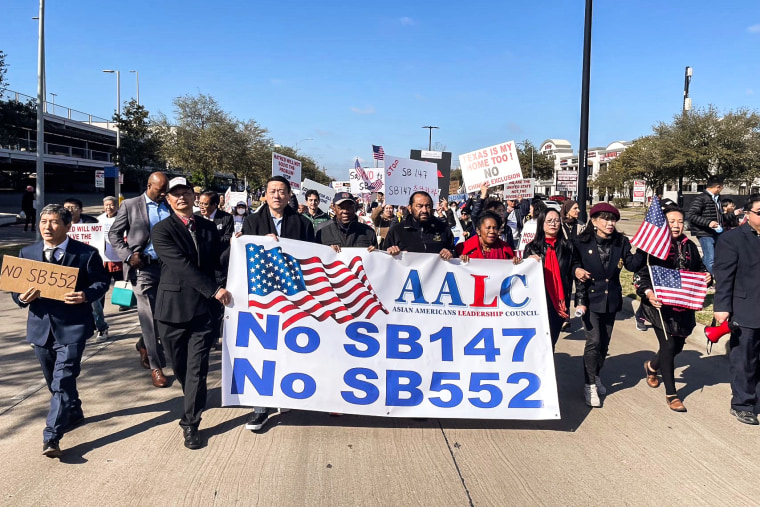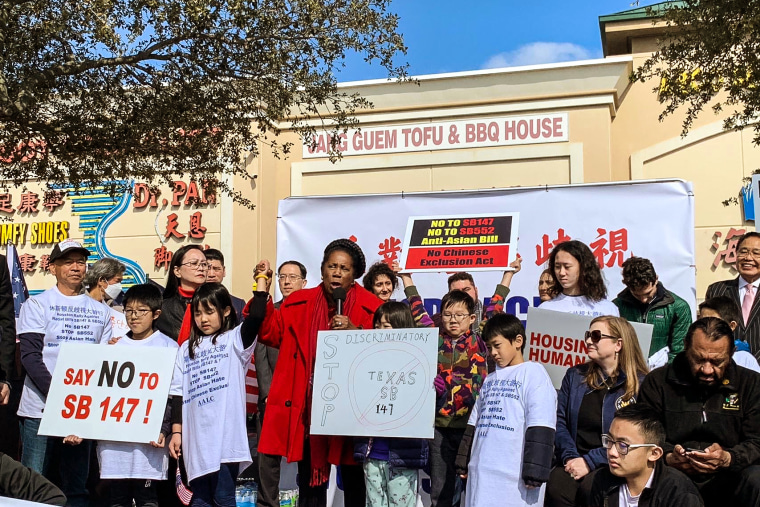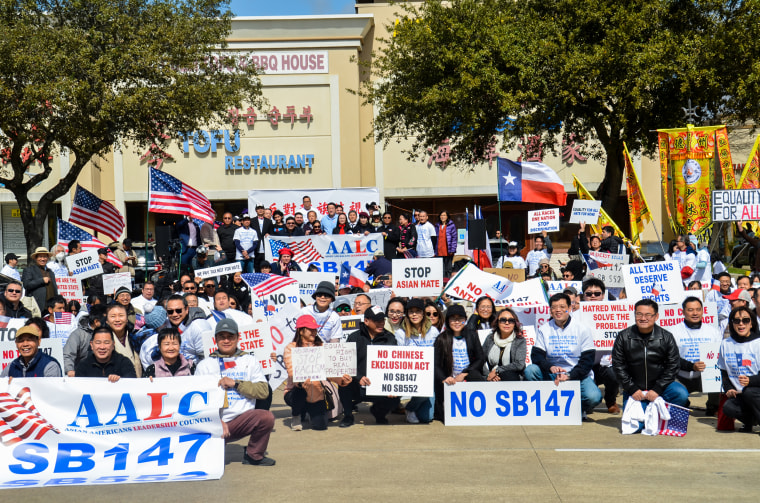Results 1 to 4 of 4
Thread Information
Users Browsing this Thread
There are currently 1 users browsing this thread. (0 members and 1 guests)
-
04-10-2023, 04:07 AM #1
History repeats itself with anti-China land ownership proposals
History repeats itself with anti-China land ownership proposals
Analysis by Zachary B. Wolf, CNN
Updated 12:19 AM ET, Sat February 18, 2023
y B. Wolf, CNN
Updated 12:19 AM ET, Sat February 18, 2023

A rally against state Senate Bill 147,which would ban Chinese citizens from buying real estate in Texas, outside City Hall in Houston on January 23.
A version of this story appeared in CNN's What Matters newsletter. To get it in your inbox, sign up for free here.
(CNN)New efforts to bar Chinese citizens and others from owning property in Texas and other states echo the treatment of Asian people in the US more than 100 years ago, when Congress barred them from obtaining citizenship and multiple state laws restricted land ownership.
- In Virginia, Gov. Glenn Youngkin is expected to sign legislation to bar citizens of countries the State Department has designated as "foreign adversaries" from owning agricultural land. Companies with deep ties to those countries would also be affected. Those countries currently include China, Russia, North Korea and Iran. There are similar proposals in Montana, Wyoming and North Dakota. Foreign owners control a fraction of US farmland, according to the Congressional Research Service.
- In Texas, a much broader proposal names those countries and bans citizens of them from owning any land whatsoever. The ban would presumably extend to legal immigrants living in the US. That bill is still working its way through the legislature but has the support of Gov. Greg Abbott.
The Texas proposal in particular specifically recalls a despicable chapter in US history, when so-called Alien Land Laws were passed in numerous states between the 1880s and 1920s to specifically bar Asian people from owning land. The California Alien Land Law was eventually overturned by the Supreme Court in 1952 for violating the 14th Amendment.

In 1923, the Hollywood Association started a campaign to expel the Japanese from their community. Hollywood resident, Mrs. B. G. Miller, points to an anti-Japanese sign on her house.
Chinese people were explicitly barred from immigration to the US for generations -- from the 1880s, when Congress passed the Chinese Exclusion Act, until that law's repeal during World War II.
A ban on people 'ineligible for citizenship' owning property
So few Chinese people were allowed to immigrate for another generation after that until 1965 -- 105 per year -- that it amounted to a de facto ban.
As a result, the anti-Asian property laws mostly affected Japanese Americans.
While the laws did not specifically single out Asians, they were applied to people "ineligible for citizenship."
That made the lawsspecifically apply to Asians since Congress, at the time, allowed citizenship only for immigrants coming from Europe or Africa.
The most notorious example of Alien Land Laws was in California, which passed multiple versions of these laws over the years, and where Asian immigrants were concentrated.
One celebrated and yearslong court battle pitted a Japanese immigrant, Jukichi Harada, who found a way around the law by having his children own the house where his family lived in Riverside, California. They were ultimately able to keep the house when a judge ruled in their favor in 1918, but they were later moved to internment camps during World War II because of their Japanese ancestry.
Today, the Harada House is a National Historic Landmark and a museum.
Reinvoking the 'Yellow Peril'
I called Madeline Hsu, a history professor and expert in Asian American studies at the University of Texas at Austin, to ask if these new proposals are an example of history repeating itself.
"It's definitely sort of reinvocation of kind of what people in Asian American studies would refer to as 'Yellow Peril' fearmongering," she said.
"There are ways in which it resonates with what happened to Japanese Americans during World War II, where regardless of citizenship, regardless of nativity, theywere racially categorized as enemy aliens."
Alien Land Laws in Texas
Hsu pointed me to an article in the Journal of Southern History by the University of Texas Rio Grande Valley professor Brent Campney that documents fears of a Japanese "invasion" in the Rio Grande Valley more than 100 years ago.
'Exacerbating tensions'
Campney's larger argument in studying the treatment of Asian Americans, in this case people of Japanese descent, is that the local discrimination in Texas and also California reverberated back into the growing animosity between Japan and the US leading up to World War II.
Decades before the US government robbed Japanese Americans of their rights and held them in camps, Campney writes, "white Americans appealed to the same stereotypes and exclusionary impulses used against the Japanese during the internment, exacerbating tensions between Japan and the United States."
That's a historical lesson everyone has an interest in learning as tensions between the US and China grow today. The US military is maneuvering with allies to control China in the Pacific. The US government is focused on making the economy more independent from Chinese manufacturing. There is even talk of banning TikTok, the app popular with young people in the US and owned by a private Chinese company.
The problem of targeting people by nationality
These efforts against a government seep into more problematic territory when they seem to target the many Chinese and ethnic Chinese people who live in the US.
"Targeting people by nationality is also problematic," Hsu said. "That's not a good way of identifying people who are national security risksor who are acting on behalf of a foreign government."
She drew a correlation between these new state proposals and former President Donald Trump's promise to enforce a ban on Muslims traveling to the US. In order to get a plan through the Supreme Court, he instead banned, for a time, travel from certain countries in Africa, Asia, the Middle East and South America.
The Texas bill similarly targets specific countries by name and generalizes that all citizens of those countries could be a threat.
"The only thing it does is it expresses these kinds of gut suspicions and hostility to these countries," Hsu said.
History repeats itself as states move to ban Chinese citizens from buying property - CNNPolitics
If you're gonna fight, fight like you're the third monkey on the ramp to Noah's Ark... and brother its starting to rain. Join our efforts to Secure America's Borders and End Illegal Immigration by Joining ALIPAC's E-Mail Alerts network (CLICK HERE)
-
04-10-2023, 04:10 AM #2
These US States May Ban Chinese, Other Country's Citizens From Buying Land
The Texas proposal also would bar Russians, Iranians and North Koreans from owning real estate. But the principal target appears to be Chinese nationals.
World NewsAgence France-PresseUpdated: February 10, 2023 12:25 pm IST

Foreign ownership of farmland and other real estate is becoming a hot issue in US (representational)
Houston: The US state of Texas is considering barring Chinese citizens from buying property on national security grounds -- and as tensions with Beijing rise other states may follow suit. The Texas proposal also would bar Russians, Iranians and North Koreans from owning real estate. But the principal target appears to be Chinese nationals.
The draft proposal was offered up in November 2022 by Republican Lois Kolkhorst, a state senator in Texas in the southern US.
"One of the top concerns for many Texans is national security and the growing ownership of Texas land by certain adversarial foreign entities," Kolkhorst has said.
Governor Greg Abbott, a fellow Republican and fierce advocate of more severe immigration policies, says he will sign and enact the proposal if it passes the state senate.
'Blatant discrimination'
Foreign ownership of farmland and other real estate, particularly by Chinese citizens or businesses, is becoming a hot issue in the United States, and not only in Texas. Florida, Arkansas, South Dakota and eight other states are considering legislation to restrict foreign ownership.
Texas, though, may be a bellwether. With 28.8 million citizens, Texas is the second most populous state. Of its residents, 1.4 million define their ethnicity as Asian, and 223,500 say they are of Chinese origin, US census data shows.
Houston, the fourth largest US city, has 156,000 residents who identify as Asian.
They include US citizens with Asian heritage but also Chinese permanent residents -- or green card holders -- who are not naturalized citizens.
"All these people are paying taxes here," said Ling Luo, a first-generation Chinese immigrant who is director of the Asian Americans Leadership Council. "(They) are paying a tremendous contribution to the universities, to education."
Even though the proposal also targets other nationalities, Luo said the Chinese are most numerous.
Others say ethnic Chinese are simply the target of discrimination du jour.
"Our country goes through these waves of finding immigrant groups... to demonize," said Gene Wu, a member of the Texas House of Representatives.
He noted that "China is Texas's second largest trading partner. And China is the third largest purchaser of Texas goods."
A proposal like the one on the table, he said, "could jeopardize all of those contracts."
A rise in tensions
Increased diplomatic tensions after the US shot down an alleged Chinese surveillance balloon over the weekend may boost efforts to restrict foreign real estate ownership, Wu said.
"There's some people who are using the rise in tensions as an excuse to come after community members," said Wu, adding, "there is a difference between people with Chinese heritage and the government of China."
Kolkhorst, who proposed the Texas legislation, said the spark behind the bill was the purchase of 130,000 acres (52,600 hectares) by a retired Chinese army officer linked to the Communist Party.
The land is near Laughlin Air Force Base east of Del Rio, a city near the border with Mexico.
Sun Guangxin, the real estate tycoon who was the buyer, said he wanted to build a wind and solar farm, but Texas in 2021 blocked the project.
The state legislature, citing national security concerns, passed a law that barred any project linked to the governments of China or the other three nations from connecting to the grid.
Wu said that law "made sense," but the new proposal affects a broad class of people and the ends don't justify the means.
According to the National Association of Realtors, in the 12 months until March 2022, Chinese investment represented six percent of foreign residential purchases in the United States.
'Not written on your face'
"Our family didn't just come from China, we fled from China," Wu said. "My family went through the Cultural Revolution and all that stuff," he added, referring to the 1966-1976 period of upheaval as communist leader Mao Zedong sought to purge all rivals.
Senator Kolkhorst said that her proposed bans would not affect people with US citizenship or permanent resident status nor anyone "fleeing the tyranny" in their homelands.
For Luo, though, such statements are not convincing -- even to US citizens like herself.
"Who knows if you're a citizen or you aren't a citizen? It's not written on your face. Your Chinese face is what makes people come and abuse us, hate us, to beat us up," she said.
Post a comment
(Except for the headline, this story has not been edited by NDTV staff and is published from a syndicated feed.)
These US States May Ban Chinese, Other Country's Citizens From Buying Land (ndtv.com)
[/COLOR]If you're gonna fight, fight like you're the third monkey on the ramp to Noah's Ark... and brother its starting to rain. Join our efforts to Secure America's Borders and End Illegal Immigration by Joining ALIPAC's E-Mail Alerts network (CLICK HERE)
-
04-10-2023, 04:20 AM #3
Chinese citizens in Texas are incensed over a proposal to ban them from buying property in the state
“I have never seen the Chinese community this active and this motivated in my entire adult life. The community is inflamed right now. They are enraged.”

Protesters in Houston last week rally against a proposed state Senate bill that would restrict citizens of China and three other countries from buying property in Texas.
Asian Americans Leadership Council
Feb. 16, 2023, 4:24 PM EST
By Sakshi Venkatraman
Activist Ling Luo says her Chinese community in Texas has gone from fearful to infuriated — and they’re demanding that their voices be heard.By the hundreds, they’ve been taking to the streets all over the state, pleading with elected officials to kill a piece of legislation they fear could threaten their futures.
A bill introduced in the Texas Senate in late December has been gaining steam over the past month, and it came as a bombshell to Asian Americans and others across the state. The legislation, SB 147, would make it illegal for Chinese citizens to buy any property in Texas, including homes.
Luo said it’s a shocking premise, incongruous with everything she thought America was when she moved here in 1997, but by the time she heard about the bill, it had already won the support of the biggest player in Texas politics. Gov. Greg Abbott, a Republican, tweeted last month, “I will sign it.
“This follows a law I signed banning those countries from threatening our infrastructure,” he continued.
The bill, introduced by state Sen. Lois Kolkhorst, a Republican, also covers citizens and entities of North Korea, Iran and Russia. It doesn’t delineate any exceptions for legal permanent residents, visa holders or dual citizens.
Kolkhorst did not reply to a request for comment. In a news release announcing the bill’s introduction, she said it is an attempt to safeguard Texans.

Ling Luo.
Asian Americans Leadership Council
“The growing ownership of Texas land by some foreign entities is highly disturbing and raises red flags for many Texans,” Kolkhorst said in the release. “By comparison, as an American go try to buy land near a Chinese military base and see how it works out for you. It would never happen there and it shouldn’t happen here. Passing this law delivers some basic safeguards to ensure Texans remain in control of Texas land.”The Chinese population in Texas was estimated at 235,000 in 2021. Luo fears that if the bill passes in its current form, that number will decrease.
Asian residents say the legislation uses national security as a guise to further target and scapegoat their communities. They’re angry, they say, and they’re questioning whether they’re truly welcome in Texas.
As a Chinese immigrant who became a U.S. citizen years ago, Luo feels she’s one of the lucky ones. But she remembers the promise the U.S. once held for her and now says that that dream is being crushed in the immigrants around her.
“Their fear is: ‘I just got my green card. I can’t buy property anymore. How will I live here?’” she said. “Renting is not as great as the freedom of owning your own house. It’s everybody’s dream in the whole world.”
So she started an activist group, the Asian American Leadership Council, specifically to push back against the bill, and she put it on the popular Chinese social network WeChat.
Within days, she had a movement of hundreds behind her, including other leading voices in Texas.
Beyond spreading awareness of the bill, Luo and the Asian American Leadership Council have encouraged worried residents to write and call their legislators, even providing templates for those who don’t know where to begin. She hopes it doesn’t come to it, she said, but she’s even preparing people to testify before the Texas Legislature.
“There’s people who are asking if they need to get out of the state, like right now,” said Democratic state Rep. Gene Wu, who represents a heavily Chinese district. “I have never seen the Chinese community this active and this motivated in my entire adult life. The community is inflamed right now. They are enraged. “
Hundreds marched through Austin and Dallas in protest of SB 147 on Jan. 29. Since then, the movement has only grown across the state, and last week, Wu, Luo and around 1,000 other Texans held a rally in Houston. “Stop Asian Hate” and “Stop Chinese Exclusion,” some of the signs read.
Wu thinks back to his childhood, when his parents, who were both on visas, bought their first home together.
“My question is what does my childhood home, this dinky little house that my parents bought for $60,000, have to do with national security? I’ve not gotten an answer,” he said.
 Protesters in Houston denounce state Senate Bill 147 on Saturday. [COLOR=var(--caption--source--color)]Asian American Leadership Counci
Protesters in Houston denounce state Senate Bill 147 on Saturday. [COLOR=var(--caption--source--color)]Asian American Leadership Counci
He drew comparisons to national legislation from the 1800s and the 1900s that were primarily designed to stop Asian farmers from buying land in several states, like the Alien Land Laws. Others have said it’s reminiscent of the Chinese Exclusion Act of 1882, which banned immigration of Chinese laborers to the U.S. altogether.
What scares Wu the most, he said, is that the bill is gaining support among Republicans in Texas.
Recommended
U.S. NEWS
Surfer bitten by shark at busy Honolulu beach

WORLD
Avalanche in French Alps kills at least 4 people
“There’s this idea of perpetual alienness, this idea that Asian Americans can never truly be American, they can never truly be loyal, they can never truly be one of us,” he said. “And this is something that our community has struggled with since there was such a thing as ‘Asian American.’”
The Congressional Asian Pacific American Caucus, chaired by Rep. Judy Chu, D-Calif., denounced SB 147 in a release sent out Wednesday.
“While we do not oppose limitations on foreign state-owned enterprises, or on entities, companies, or individuals with ties to foreign governments, from making purchases of agricultural land or property, we staunchly object to any legislation — at the federal, state, or local level — that bans an individual from land or property ownership solely based on their country of origin,” the statement read.
Although the bill names four countries specifically, Luo said she worries that the fallout will be on all Asian communities and that others could fall victim to scapegoating.
“If we’re here legally, why do we have to get excluded?” she said. “You’re targeting people without citizenship, but how do you tell who is a citizen? Will we have to hold our passports every day in our handbag?”
 Asian residents of Texas say the proposed legislation uses national security as a guise to further target and scapegoat their communities.
Asian residents of Texas say the proposed legislation uses national security as a guise to further target and scapegoat their communities.
Asian Americans Leadership Council
The bill is unconstitutional and unlikely to pass, one expert says
Some bills introduced in the Texas Legislature are meant to be symbolic, said Mark Jones, a professor of political science at Rice University in Houston. He says SB 147 may be one of those.
In its present form, the bill has the potential to take a toll on the state’s economy, he said.
“They didn’t take into account that you have a nontrivial number of legal permanent residents and citizens who also have passports from these countries,” he said. “They also didn’t fully take into account the impact that it might have on residential housing or commercial properties.”
Jones said he’s almost certain the bill won’t pass in its present form. While the stripping of rights from foreign governments is one thing, he said, taking them from individuals is another.
“That article would be unconstitutional,” he said. “That would be effectively discriminating against a subset of a group based purely on their national origin.”
After the backlash began, Kolkhorst told local media that she planned to make a few changes to the bill.
“In the committee substitute, the bill will make crystal clear that the prohibitions do not apply to United States citizens and lawful permanent residents,” she said in a statement.
Kolkhorst didn’t mention visa holders, and no updates have been made to the bill so far. Chinese residents aren’t sure they ever will be.
“The community fully expects them to do this,” Wu said. “Because I think there’s an expectation that they’re going to do whatever terrible thing they’re going to do. … This is very, very popular on the Republican side.”
Luo said the introduction of the bill has already rocked Asian Americans’ faith in Texas. Chinese residents on both sides of the political aisle have been approaching her and Wu with shock that something like this could happen. She said she doesn’t see herself as fighting a political party — she just wants her community to be safe.
Ultimately, she said, while the bill claims to target China, it’s Texans who would be hurt.
“Legislators use these kinds of bills to just play with the Chinese community here and appeal to their voter base,” Luo said. “China won’t get hurt at all, and the Chinese investors won’t get hurt at all. It’s the people here, the non-U.S. citizens, Chinese immigrants, who are the ones getting hurt and totally destroyed.”
Chinese citizens in Texas are incensed over a proposal to ban them from buying property in the state (nbcnews.com)
If you're gonna fight, fight like you're the third monkey on the ramp to Noah's Ark... and brother its starting to rain. Join our efforts to Secure America's Borders and End Illegal Immigration by Joining ALIPAC's E-Mail Alerts network (CLICK HERE)
-
04-10-2023, 04:25 AM #4
China says proposed U.S. ban on Chinese buying U.S. property violates market rules
Reuters

A home is seen in the Old Westbury section of Long Island in New York,U.S., May 4, 2017. REUTERS/Shannon Stapleton
BEIJING, Feb 10 (Reuters) - The United States is violating the principles of market economy and international trade rules in considering a ban on Chinese citizens buying property in the United States, the Chinese foreign ministry said on Friday.
"Generalizing the concept of national security and politicising economic, trade and investment issues violate the rules of market economy and international trade rules," spokesperson Mao Ning said at a regular press briefing.
Mao was responding to a question when asked about Texas and Florida considering a ban on Chinese citizens in the United States from buying property.
Texas, Florida, Arkansas and several other states are weighing legislation that would bar Chinese citizens from buying real estate, according to several reports, as tensions rise between the United States and China over national security issues.
"I want to stress that China-U.S. economic and trade cooperation is mutually beneficial in nature. Over the years, Chinese enterprises have invested in the United States and made important contributions to promoting domestic employment and economic development in the United States," said Mao.
The move comes as the United States proposes increased retaliatory measures after a Chinese spy balloon was shot down after entering U.S. airspace.
China says proposed U.S. ban on Chinese buying U.S. property violates market rules | Reuters
If you're gonna fight, fight like you're the third monkey on the ramp to Noah's Ark... and brother its starting to rain. Join our efforts to Secure America's Borders and End Illegal Immigration by Joining ALIPAC's E-Mail Alerts network (CLICK HERE)
Similar Threads
-
NDAA - Indefinite Detention - History Repeats
By AirborneSapper7 in forum Other Topics News and IssuesReplies: 11Last Post: 11-25-2014, 04:26 PM -
History Repeats
By AirborneSapper7 in forum Other Topics News and IssuesReplies: 40Last Post: 10-23-2014, 06:32 AM -
Sheriff Mack on Federal Land Ownership
By kathyet in forum General DiscussionReplies: 2Last Post: 11-09-2009, 09:29 AM -
April 19th History Repeats Itself
By OCAngel in forum Other Topics News and IssuesReplies: 1Last Post: 04-19-2009, 06:24 PM -
Carpetbaggers or Backpackers History Repeats Itself
By Dixie in forum General DiscussionReplies: 3Last Post: 04-29-2006, 02:03 AM


 LinkBack URL
LinkBack URL About LinkBacks
About LinkBacks




 Reply With Quote
Reply With Quote


Call Congress Now To Stop Invasion Votes!
05-14-2024, 02:28 PM in Non-Citizen & illegal migrant voters